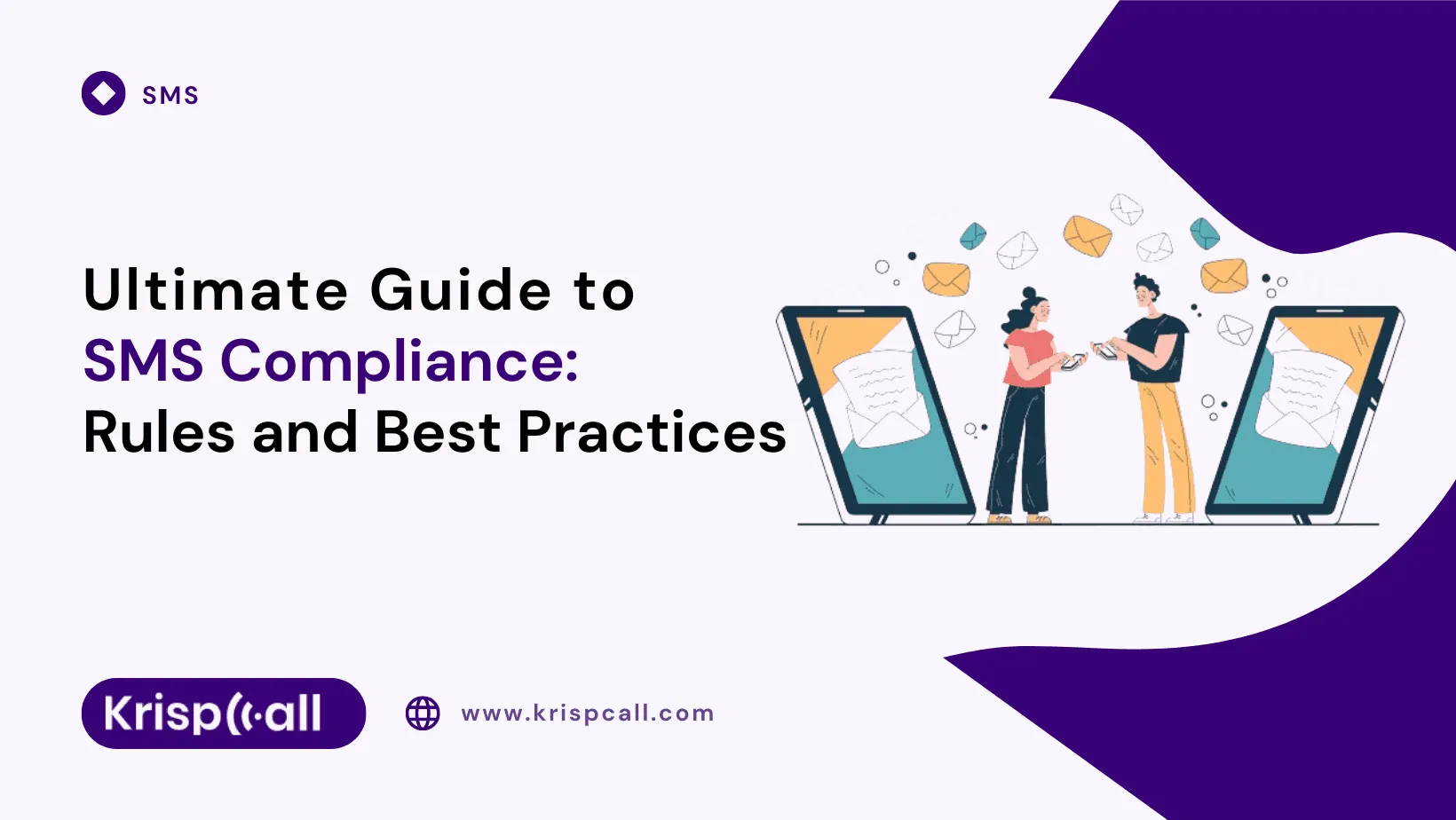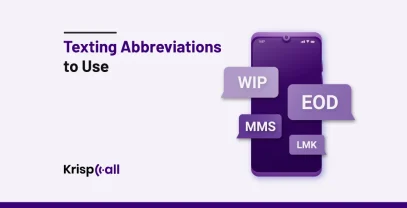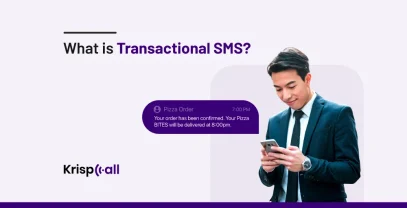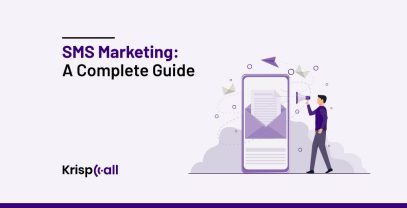In 2023, 6.89 billion people were using smartphones, a number projected to rise to 7.86 billion by 2028. Additionally, 48% of customers favor receiving business communication via text messages (SMS).🤗
SMS marketing has become a powerful tool for businesses to connect with their audience. However, with this power comes responsibility, especially when addressing various regulations to maintain ethical and legal standards.
SMS Compliance rules and regulations play a crucial role in safeguarding consumers’ interests and preserving the long-term integrity of SMS as a marketing platform. 🔒
In this comprehensive guide, you’ll explore the meaning of SMS compliance, the associated rules and regulations, key terms crucial for understanding text message compliance, checklists, and common mistakes to avoid.🌟
🗝️ Key Highlights
- SMS compliance is about following regulations and guidelines when sending text messages to consumers.
- In the US, text communication is regulated by the FCC, FTC, CTIA, MMA, and mobile network operators.
- You need to obtain consent from consumers before sending any messages.
- You should not message unsubscribed contacts to maintain compliance and protect your brand reputation.
- Common mistakes in SMS compliance include not obtaining consent, lacking opt-out options, ignoring regulatory guidelines, sending unsolicited messages, poor data management, misleading content and missing required information.
Let’s get started.🚀
What is SMS compliance?
SMS compliance is a crucial aspect of SMS marketing that involves following the rules, regulations, and best practices when sending text messages for marketing or communication purposes. SMS compliance laws help to keep consumers safe from unwanted spam texts and protect their privacy.
Text messaging compliance focuses on obtaining clear consent from customers before sending them text messages. This ensures that they clearly understand the type of messages they will receive.

SMS compliance is governed by federal and state laws that specify appropriate ways to send marketing text messages to customers.
An example of SMS compliance relates to the frequency of customer text messages. Excessive or overly frequent messaging, such as bombarding customers with multiple texts quickly, can be considered non-compliant as it may intrude on their privacy and create a negative user experience.
Rules and regulations for SMS compliance
In the United States, these are the main groups that regulate communication over text:
1. Cellular Telecommunications Industry Association (CTIA)
The Cellular Telecommunications Industry Association (CTIA) sets guidelines and standards for wireless communication, including text messaging. It is crucial in promoting industry-wide compliance and consumer protection in the wireless communications sector.
The CTIA is not a government entity. Instead, it operates as a trade association that represents mobile carriers. It collaborates to establish standards for businesses that send SMS messages.
If you violate CTIA rules, they can report you to their network of carriers, who may suspend your access to their customers until you resolve the issue.
2. Mobile Marketing Association (MMA)
The MMA promotes best practices and standards in mobile marketing, including SMS (Short Message Service) and MMS (Multimedia Messaging Service), to enhance user experience and privacy.
It is vital to advance the mobile marketing industry by advocating for user-centric practices, fostering industry collaboration, and setting standards that promote a positive and trustworthy mobile marketing environment.
3. Federal Communications Commission (FCC)
The Federal Communications Commission (FCC) is a government agency in the USA that regulates various aspects of media communication, including text messaging, to ensure fair practices, prevent spam, and protect consumer interests. It uses the Telephone Consumer Protection Act (TCPA) to set SMS compliance rules.
The TCPA is a federal law regulating telemarketing, auto-dialed, pre-recorded text messages, and unsolicited faxes. It also prohibits sending spam texts without consent, and fines for violations range from $500 to $1,500 per message.
4. Federal Trade Commission (FTC)
The Federal Trade Commission (FTC) is a federal agency like the FCC that enforces laws related to consumer protection and fair business practices. These laws also govern text messaging to prevent deceptive or unfair marketing practices.
The CAN-SPAM Act regulates text message content and delivery methods. It sets commercial message standards, requires precise recipient opt-out mechanisms, and prohibits deceptive practices. Violations of the CAN-SPAM Act can result in penalties of up to $500 per text message. Compliance with these regulations is essential for businesses engaging in SMS marketing.
5. Mobile network operators
Mobile network operators, also known as wireless carriers, are companies that provide phone and internet services to people. They work with government agencies like the FCC to protect customers from unwanted spam messages. For example, carriers like T-Mobile can fine businesses up to $10,000 per violation if they don’t follow the rules.
SMS Compliance Key Terms to Understand
Opt-in
Opt-in is a term used in SMS compliance where individuals give their permission or consent to receive text messages from a business or organization.
It’s crucial to ensure that text messages are sent only to those who have agreed to receive them. This helps businesses comply with regulations and respect customers’ preferences.
Opt-out
Opt-out is a key term in SMS compliance. It refers to the process by which individuals can stop receiving text messages from a business or organization.
It allows recipients to unsubscribe or opt out of further communications. It ensures that their preferences are respected and that businesses comply with regulations regarding communication consent.
A2P
A2P stands for Application-to-Person messaging. It is the type of text messaging where an application or software program sends messages to individuals. Businesses commonly use this for marketing, notifications, and other communication purposes.
A2P 10 DLC (Application-to-Person 10-Digit Long Code) is a system for business SMS communication. Companies register their phone numbers to improve deliverability and compliance with regulations.
Short Code
A short code is a shortened phone number, typically five to six digits long, used for sending and receiving text messages. It’s commonly used for mass messaging, such as marketing campaigns or alerts, and is easier for recipients to remember or type compared to a regular phone number.
Long Code
A long code is a standard ten-digit phone number used for text messaging, similar to regular phone numbers. Long codes are often used for one-on-one customer communication, such as customer support or appointment reminders. They can also be used for A2P (Application-to-Person) messaging, where an application sends individual messages.
Promotional text messages
These are messages sent by businesses to promote their products, services, or offers to customers. They are used for marketing purposes, including promotions, discounts, or advertisements.
Transactional text messages
These messages are related to specific transactions or interactions between a business and a customer. Examples include order confirmations, shipping notifications, appointment reminders, and account alerts. Transactional messages are often informational and directly related to a customer’s interactions with the business.
Conversational text messages
These are messages that facilitate two-way communication between a business and a customer. They are used for customer support, inquiries, feedback, or other conversational interactions.
It allow customers to respond and engage in a conversation with the business, unlike promotional or transactional messages that are often one-way communications.
Express written consent
Express written consent refers to the explicit and documented permission given by an individual to receive text messages from a business or organization. This consent is obtained through a written agreement or a digital opt-in process where the individual provides their consent in a clear and unambiguous manner.
Express written consent is a crucial requirement for businesses to send promotional or marketing text messages to consumers. It ensures compliance with SMS regulations and respects the recipient’s preferences.
Text spam
Text spam is unsolicited or unwanted text messages sent in bulk, often for promotional or advertising purposes, without the recipient’s consent. Text spam or Smishing spam is considered a violation of SMS compliance regulations and can result in fines or penalties for businesses that engage in such practices.
Terms and conditions
These rules and guidelines govern the use of a product or service. In the context of SMS compliance, terms and conditions outline the terms of engagement between a business and its customers regarding text messaging, including consent requirements, message frequency, opt-out procedures, and other compliance-related information.
Privacy policy
A Privacy policy explains how a business collects, uses, shares, and protects its customers’ personal information. In SMS compliance, a privacy policy should include details about how customer data collected through text messaging is handled, stored, and safeguarded. It creates privacy and compliance with data protection laws.
The ultimate SMS compliance checklist: Best practices for ensuring SMS compliance
Here’s the ultimate SMS compliance checklist with best practices to ensure SMS compliance:
*Disclamer: Kindly note that this information is for informational purposes and should not be construed as legal advice. It is not a replacement for consultation with a qualified legal advisor, and you bear full responsibility for all legal matters.
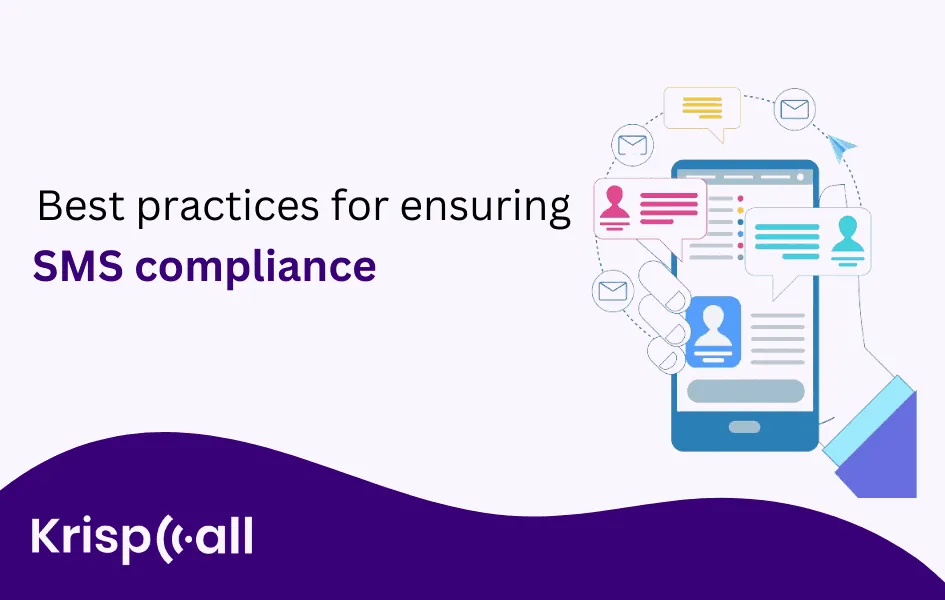
1. Obtain prior express written consent
You must have express written consent from customers before sending them marketing messages via SMS. This can include opt-in forms, checkboxes, or text messages that confirm their consent.
You can face fines ranging from $500 to $1,500 per incident for texting consumers who did not give authorization.
You should only text someone if they contact you first or if you have an existing relationship with them, like if they’ve bought something from you.
Otherwise, you need to make it clear on your sign-up pages that people agree to receive regular texts from you. You must also follow CTIA guidelines, including terms and a privacy policy link.
2. Introduce yourself in the first message and include opt-out instructions
When you introduce yourself in the first SMS message, you establish a clear identity for your business. This can include your company name or the name of the person sending the message, along with a brief but informative description of why the recipient is receiving the message. For example, you might mention that when they signed up for updates, promotions, or notifications about your products or services.
Example: “Hello! This is XYZ Company. You are receiving this message because you recently signed up for our updates. If you no longer wish to receive messages, reply ‘STOP’.” You may choose to use a different opt-out keyword in addition to “STOP,” such as “STOPALL,” “UNSUBSCRIBE,” “QUIT,” “CANCEL,” or “END.”
3. Describe program details at opt-in
You should clearly explain what customers can expect when they opt-in to receive SMS messages from your business. You should include the frequency of messages and the type of content they will receive.
When you include a call-to-action for opting into your SMS program, you must provide the following details:
- Your company name in every message you send
- The type of messages customers can expect
- Frequency of your message
- Notification about text messages and data rates
- Link to your terms and conditions
- Privacy policy link for more information
- Opt-out informations
4. Confirm opt-ins
You need to verify that the opt-in process is legitimate and that customers have indeed agreed to receive messages from your business. You should avoid purchasing or using third-party lists without proper validation.
Even if you make your consent information clear during sign-up, it’s a good idea to use double opt-in for text marketing. This means asking subscribers to confirm their sign-up by replying with a “Yes” or similar confirmation text.
5. Explain terms and conditions
You need to clearly communicate the terms and conditions of your SMS marketing program with information about privacy, data usage, and how customers can opt out.
Make sure to include a link to your terms and conditions in the first message you send. You should remind your customers periodically about how they can find and read the policy. Also, text your subscribers whenever there are updates or changes to the terms and conditions.
6. Let people know how to reach you
You can include a phone number in your text that subscribers can use to contact you, especially if you’re using a shortcode. It is a must to follow FTC policy.
The CTIA also requires you to give recipients the option to ask for help by replying “help” to your texts. This should provide details about your program and how to get more assistance.
7. Schedule texts appropriately
Under TCPA rules, companies can’t send promotional texts or make calls outside of 8:00 AM to 9:00 PM. These hours are determined by the time zone of the person receiving the message.
8. Avoid using prohibited language (follow SHAFT rule)
The SHAFT rule in SMS compliance refers to avoiding prohibited language in text messages. SHAFT stands for Sex, Hate, Alcohol, Firearms, and Tobacco. These topics are heavily regulated and can be sensitive or inappropriate for specific audiences.
It is crucial to avoid using content related to these categories in your SMS marketing messages to ensure compliance with regulations and maintain a positive brand image.
9. Avoid messaging unsubscribed contacts
Avoid messaging unsubscribed contacts means not sending text messages to individuals who have opted out of receiving messages from your SMS marketing program.
It’s essential to respect their preferences and comply with regulations such as the Telephone Consumer Protection Act (TCPA). Messaging unsubscribed contacts can result in legal consequences and harm your brand’s reputation. You need to be very careful on this matter.
10. Monitor and update opt-in/opt-out lists regularly
You must keep track of customer preferences and update your contact lists to ensure compliance. It also enhances the effectiveness of your SMS marketing efforts by targeting engaged and interested recipients.
What are the common mistakes to avoid in SMS compliance?
The common mistakes to avoid in SMS compliance are:
- Failure to Obtain Consent: When you send text messages without obtaining proper recipient consent, it violates SMS compliance rules.
- Lack of Opt-out Mechanism: Another common mistake to avoid is not providing recipients with a straightforward and easy way to opt out of receiving further messages.
- Ignoring Regulatory Guidelines: Ignoring or not staying updated with regulatory guidelines, such as those set by the CTIA, FCC, and FTC, can lead to non-compliant messaging practices.
- Sending Unsolicited Messages: Sending messages to individuals who have not explicitly opted in to receive them is considered spam and violates SMS compliance regulations. You need to avoid sending unsolicited messages.
- Poor Data Management Practices: Failure to maintain accurate and up-to-date opt-in/opt-out lists can result in compliance issues.
- Misleading Content: Text messages that include misleading or deceptive content can lead to complaints and potential legal consequences.
- Failure to Provide Required Information: Another mistake to avoid for SMS compliance is not including required information in messages, such as business identification, opt-out instructions, and terms and conditions.
Wrapping Up
SMS compliance is crucial for businesses using text message marketing. Following this guide’s rules, regulations, and best practices helps your companies to safeguard consumer interests, uphold ethical standards, and avoid penalties.💫
SMS compliance guidelines are essential for protecting people from spam and maintaining privacy. Businesses must focus on SMS compliance to maintain good customer relationships and comply with the law. Compliance ensures you only message customers who want to hear from you. This will lead to higher response rates and better performance.
Text messaging services (SMS) and cloud phone systems like KrispCall offer competitive pricing and excellent monthly or annual plans for businesses of all sizes. KrispCall offers seamless text messaging, including features like SMS auto-replies for missed calls, bulk SMS, and SMS forwarding.
FAQs
Is it necessary to obtain prior express written consent before sending marketing text messages?
Yes, it is necessary to obtain prior express written consent before sending marketing text messages. This consent demonstrates that the recipient has willingly agreed to receive marketing messages via SMS, ensuring compliance with regulations and respecting the recipient’s preferences.
Should businesses avoid messaging customers who have unsubscribed from their marketing texts?
Yes, businesses should avoid messaging customers who have unsubscribed from their marketing texts. It’s important to respect their preferences and comply with SMS regulations to maintain a positive relationship with customers and avoid potential penalties for non-compliance.

